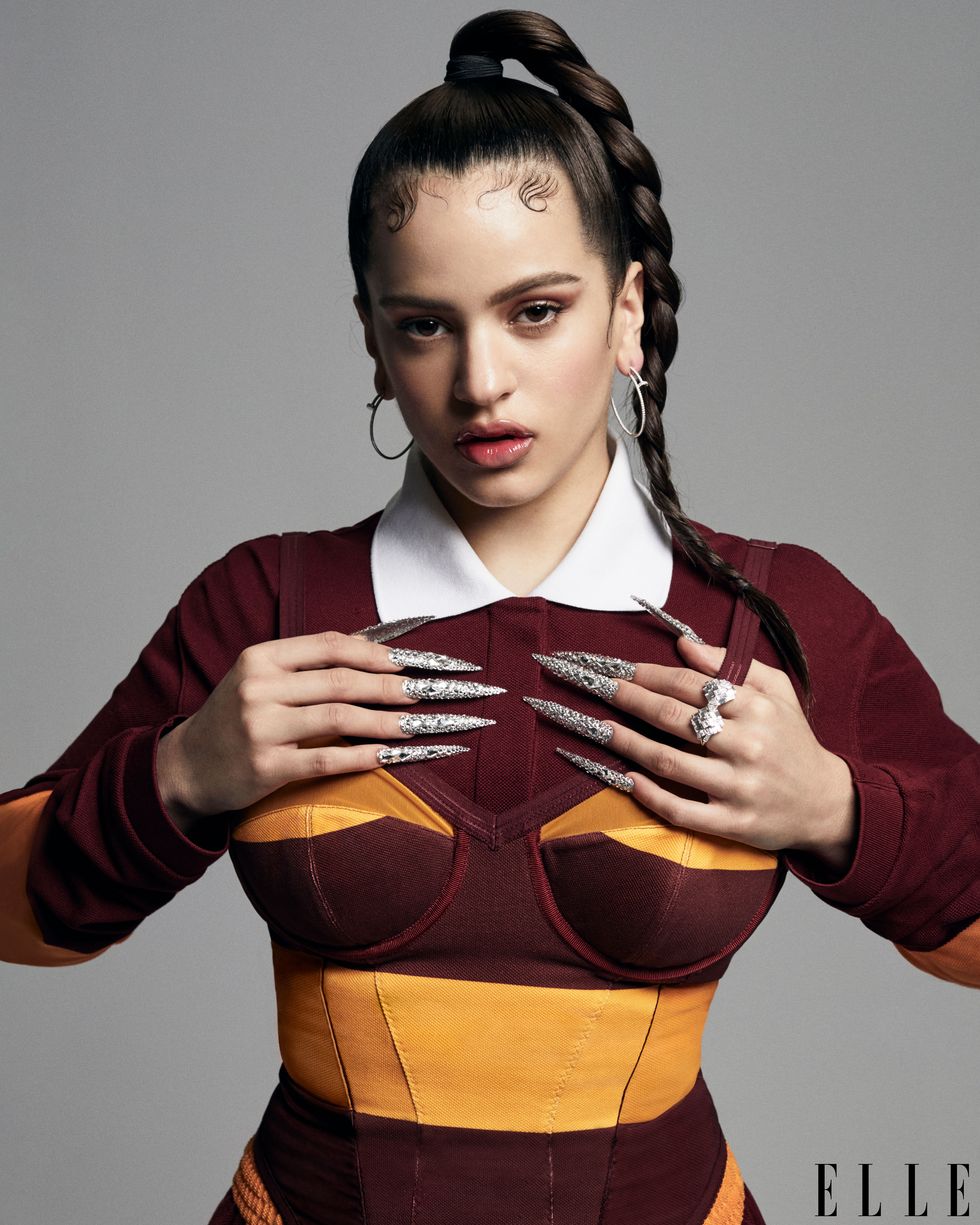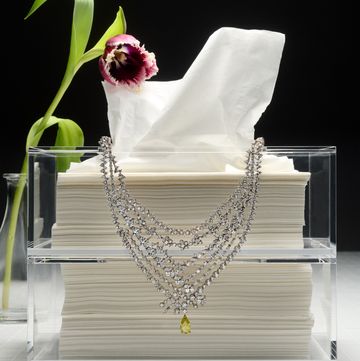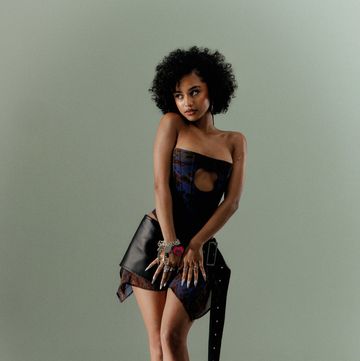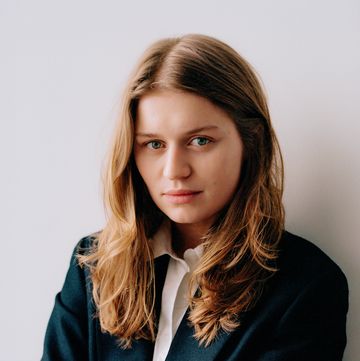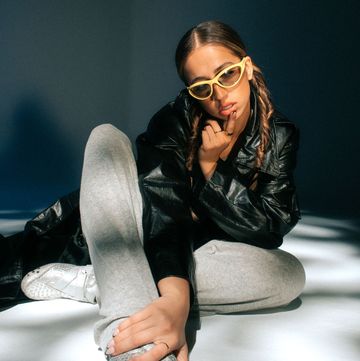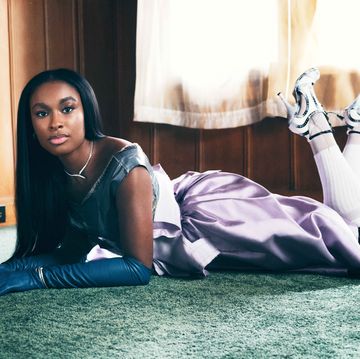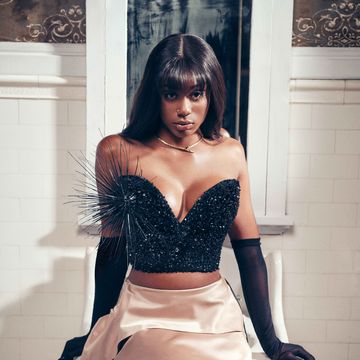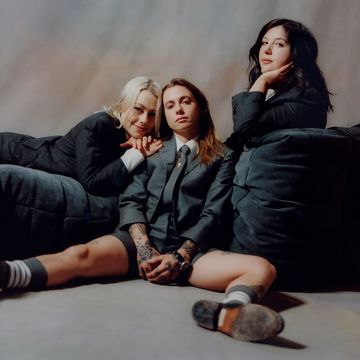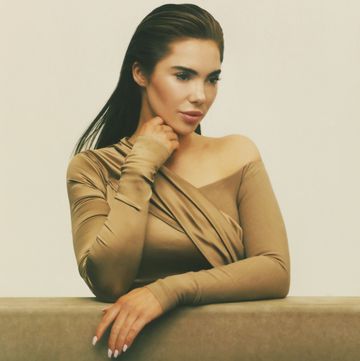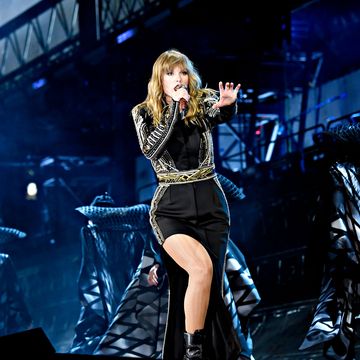I meet Rosalía a few days before the world stops, just as things are starting to get weird. When I arrive in her hotel room at the West Hollywood Edition, she is multitasking: working on a new ballad, her first song in that format, while getting her hair styled. Her instructions for the sound engineer are as assured and precise as her feedback for the hairstylist, who is fastening rows of rainbow-colored butterfly clips to rows of pulled-back hair. A pause in the song needs to be a beat longer, and the twists in her hair should be fuller, because every detail matters when you’re on your way to taking over the world.
Rosalía is scheduled to fly back home to Spain, where the COVID-19 crisis is spiraling, a couple of days later, but the lockdowns force a sudden change of plans, and she ends up isolating in Miami, where her manager, Rebeca León, lives. “It’s always hard to be far from your family, in another country, and more so at a moment like this,” Rosalía says. “But given the situation, I’m lucky to have great friends here in Miami I can lean on.” Other than missing her family and friends back home, the hardest part has been “having to stop suddenly, since I’m a person who is always involved in lots of projects and traveling all over the place,” she says. “What’s changed for me is realizing that from one day to the next, there are things that can cease to exist. It’s like the world stopped, literally.”
But she can’t sit still for long, so she’s set up a makeshift recording studio to put the final touches on a new song. She posts a photo of it on Instagram and Twitter; she’s smiling, surrounded by recording equipment, above a caption that reads, “I’ll set up my studio anywhere!” Followed by a tweet with a sad-face emoji, then prayers.
The ballad she’s perfecting, “Dolerme” (“Hurts Me”), is about a failed relationship, but when it drops in late March, it is accompanied by an illustration in blue hues of a girl who looks like Rosalía, lying on a bed with a phone, a knife, and an angry-looking Chihuahua, a discarded surgical mask beside her on the floor. In a message to fans, she writes: “Many of us are in quarantine, and many are taking risks to help others outside of home. I am in quarantine, and I have lost track of time a bit because I decided that I was not going to think about it too much and that instead I was going to put my energy and my heart into doing something for others, in my own way. I know that what I do as an artist may seem expendable—for some it will be—but for me, being able to make music is mental health.… I hope it makes [people] feel a little better, like it did for me when I made it.”
As León tells me later, the original plan was to release a different song. But given current events, Rosalía decided to change direction. “She showed me this song last week, and I started crying when I heard it. It’s really emotional, and the reaction we’re getting is so powerful,” León says. “Music, in the end, is a healer. Music has this incredible power, no matter what’s happening in the world.”
She may have dropped a new song at the height of the pandemic, but Rosalía also understands that it’s important to be kind herself right now, too. “I’m making progress on my music, but notwithstanding, I wanted to remark on something that seems to be happening to a lot of people, myself included,” she says. “There’s this kind of pressure to be creative or busy most of the time, with lots of activities and progress, and I’m trying to run from that. I’m trying to do things that help keep me mentally healthy, and if that includes making music, then great. But I won’t lie—there are days when I just watch a show and eat a packet of cookies.”
It feels strange to be writing about a pop star at this particular time, but the fact that it’s Rosalía makes it seem okay somehow, because now, even more than before, she feels emblematic of the moment. Maybe it’s the way she seems to have emerged out of nowhere, fully formed, as a rising global pop star. Or the way her music and her style fuse together cultures and traditions, referencing a variety of art forms and mirroring our interconnected lives. Or perhaps it’s her seriousness and discipline, her intense scholarship, her burning passion. Rosalía is only 27 and looks younger, but she emanates such power, it makes you realize how frivolously that word gets thrown around.
The first time we speak, in early March, we can still move around freely and go about our normal business, despite the rapidly encroaching signs that everything is about to change. In the back seat of an SUV, on our way to a Hollywood sound stage with her team, I have a chance to admire Rosalía’s famous nails up close: They’re long and pointy, with chips from a vintage camera embedded in the gel, like fossils from the future preserved in amber. She thinks they make her look fierce, and they do.
Once we arrive at the sound stage, she disappears into a back room to do her impressively operatic vocal warm-ups. After a while, she emerges in an oversize graphic tee and enormous thigh-high platform boots and perches on a stool to play an improvisational game of Song Association for a video she’s shooting for this magazine. She takes it as seriously as she takes everything, which is to say very. She questions if one of the words is correct. She does several takes of her own song, even though it sounds perfect every time. She checks the monitor and thinks the light on her face is too harsh. She makes a suggestion, the lights are adjusted, and she does look better. If this makes her sound like a diva, it isn’t meant to; she’s sincerely nice to everyone around her—her team, drivers, waiters, interrupting fans. It’s just that she has a vision, and her vision is total.
In January, Rosalía performed two songs at the 62nd Grammy Awards. Alicia Keys introduced her as the “Spanish sensation waking up the world,” and it’s true—there’s something about her music that jolts you to attention. Dressed in a white fringed pantsuit and chunky platform sneakers, she belted out an electrifying version of “Juro Que” in front of mirrored panels, accompanied by a flamenco guitarist. The stage lights flashed on and off, making her look like a bolt of lightning. For her performance of “Malamente,” she was joined by a crowd of dancers in red jumpsuits. Earlier in the evening, she’d won the Best Latin Rock, Urban or Alternative Album. She was also nominated for the Best New Artist award, a first for an artist singing entirely in Spanish. (Billie Eilish won that one.)
“The Grammys experience, really, was like, Wow,” she tells me later, over sushi, after graciously agreeing to take pictures with two women who had been eyeing—and surreptitiously filming—our table. “It was a big deal for me. My whole life, I’ve watched the artists I most admire perform on that stage, you know? And suddenly, to find myself singing flamenco and dancing a little seguidilla [a Spanish dance in triple time], I felt so grateful, I swear. I felt so embraced. I cried in the car on my way to every rehearsal. I couldn’t believe what was happening.”
Rosalía, whose full name is Rosalía Vila Tobella, was raised in Sant Esteve Sesrovires, a small town in northeastern Spain, in Catalunya, about 23 miles outside Barcelona. Her mother worked for a family business that manufactured metal plaques, and her father worked in construction. Rosalía and her older sister, Pilar, were always urged to be creative. They ran around in a pack with nine cousins, playing dress-up in the woods, singing and putting on shows, and going to music fairs.
Her parents instilled a love of music, encouraging her to sing from a young age. There’s a now-famous story about how her father asked her to sing at a family gathering when she was seven, and when she opened her eyes after performing, adults were crying. She started learning guitar and solfège—a method of sight-reading and singing used to teach aural skills and pitch—at age 9, and by 10, she knew she wanted to be a singer. “I wanted to study,” she says. “I wanted to learn.”
Flamenco, the genre of music Rosalía is most often linked with, combines various folklore traditions from Andalusia, in southern Spain, and is closely associated with the Romani people. The factories outside Rosalía’s town attracted workers from Andalusia, and their children—Rosalía’s classmates and friends—introduced her to flamenco. “I’d never heard flamenco in my whole life until I was 13,” she says. Music had always served a spiritual function for her—it made her feel connected, it calmed her, it made her move—but flamenco took hold of her imagination in a way nothing had before. “It is one of the most sincere forms of music out there,” she says. “The most honest, most passionate, most visceral.” She began studying flamenco singing as well as the piano, the instrument she now composes on.
When she was 19, she was admitted into the Escola Superior de Música de Catalunya to study under José Miguel Vizcaya, known as Chiqui de la Línea, a legendary flamenco teacher who only takes on one student at the college per year. Without connections in the industry, she began performing at bars and weddings to showcase her skills.
By any measure, her success came early, but to her it feels like she took her time. “I was never in a hurry to make my first album,” she says. “I knew I wouldn’t do it until I knew exactly what I wanted it to be.” When she was 17, she met a manager who represented a major artist in Spain, who proposed a project that sounded very pop. “For me, it was like, No, that’s not going to be my first album,” Rosalía says. She turned her down. Waiting until she was around 22 to make her first album, and doing it on her own, gave her time to study and absorb. She soaked up many forms of music and synthesized them in a unique and layered way. “I want every album to be different, to feel alive,” she says.
In her view, what really makes a difference in an artist’s work is drive. Since beginning her formal education, and since having surgery on her vocal cords at age 16, she has devoted herself to her music. “People might think it’s such a tra-la-la life, but it’s the opposite,” she says. “I’m in the studio all the time, chipping away.” It’s all about discipline, she says: “How much do you care about your vision and being faithful to it?”
Rosalía was still in college in February 2017 when she released her first album, Los Ángeles, independently. That summer, she performed at a flamenco theater in Madrid for an audience of about 50 people, among them the Colombian singer and musician Juanes, whom her now manager, León, was representing. “He’s not a dramatic person; he’s not exaggerated,” León says of Juanes. But when he heard Rosalía sing, “He was like, ‘I cried, and this is probably the most important artist that we’re going to see in 50 years,’ ” León recalls. “He was like, ‘She’s one of a kind. You have no idea. This girl is going to change music.’ ”
A few months later, in December, Juanes invited Rosalía to sing a duet with him at his concert at the WiZink Center sporting arena in Madrid. León says she was surprised when Rosalía suggested singing a tango. “I was like, ‘She’s got depth,’ ” she says. “Not every person is going to suggest a tango.” Rosalía impressed her further when she came to the sound check and was “such a boss onstage—the way she was telling the monitor guy how she wanted the mics in her ear and moving the stage,” León says. “I just could not believe the power that this woman emanated. It was insane. She knocked me on my ass.” León signed her the following month.
Rosalía’s second album, El Mal Querer, released in November 2018, began as her thesis project. Her idea was to do a conceptual album about a toxic relationship: “that relationship you know is going to end badly, but even though you know, you go ahead and do it,” she says. “I wanted to investigate possessiveness and jealousy, and talk from a place of a [dark] love.”
She produced the album with Pablo Díaz-Reixa, better known as El Guincho, over a two-year period, in his tiny fifth-floor walk-up apartment in the Born district of Barcelona. “We did it with a sound card, a microphone, two computers, and a MIDI keyboard,” she says. “Just Pablo and me.”
Her vision extends to her music videos, each of which is a complex, dizzyingly referential tour de force. In the video for “Malamente,” a motorcycle she’s riding plays the part of a bull in a fight against her bullfighter lover. The video for “Aute Cuture,” a single, is set in a nail salon; Rosalía plays the head of a beauty gang that controls the town through nail art. “For years, I’ve been so passionate about nail art and about doing my nails constantly, with different nail artists from around the world,” she says. “Every time I travel, I want to see how people do it in other places. It’s such an ephemeral art, but it’s an art—little works of art in miniature.”
One reason Rosalía is in a class by herself is the fact that she has risen to the ranks of global pop stardom—two of her singles, “Malamente” and “Pienso en Tu Mirá,” became worldwide hits, and she counts Frank Ocean, Dua Lipa, Billie Eilish, and the Kardashians among her fans—while remaining true to her roots. Writing in the Spanish newspaper El País last year, the journalist Guillermo Alonso noted that she stands out among Spanish pop stars who’ve risen to global fame in that she did it by “using Spain as her trademark.” In other words, “she doesn’t sing in English, she doesn’t use Swedish producers, she hasn’t had to sing with British or U.S. stars, and she hasn’t gone to live in Miami,” he wrote.
Which is, in part, what makes the controversy that has surrounded her surprising. Some have accused her of appropriating flamenco and Andalusian culture and imagery. “Why does Rosalía—who speaks like a pija [a preppy upper-middle-class girl]—when she sings use gypsy words and pronounce them like an Andalusian?” wrote the Romani activist Noelia Cortés on Twitter. “If she did not think she was stealing anything, she would pronounce with her natural accent—she would not disguise herself as something that isn’t even remotely like her normal speech.” Rosalía was taken aback. Flamenco was an integral part of the cultural fabric when she was growing up. “Andalusian culture is present in Catalunya because there have always been immigrants from that region,” she says. “That’s the way it is. It’s a fact. Flamenco is in Catalunya.” Flamenco itself is a fusion of cultures (Romani, Sephardic, Moorish, Spanish), and its echoes can be found in all kinds of popular music. Not to mention that many of Rosalía’s early influences—Frank Sinatra, Bob Marley, Bob Dylan, David Bowie—came from outside Spain. “It’s so beautiful and so interesting that, in such a globalized world, we’re involved in so many different cultures, not just the culture that’s right around you.”
Other criticism has plagued her as well. When her reggaeton-inspired single “Con Altura,” made in collaboration with the Colombian singer J Balvin, won Best Latin Music Video at the 2019 MTV Video Music Awards, some asked whether, as a Spaniard, she qualified for the award. After releasing “Milionària,” her first song in Catalan, she was criticized by some for bastardizing Catalunyan with Spanish-isms.
León says the controversy is a sign something is working. “She’s going to make people uncomfortable because she’s changing things,” she says. “Today, any kid in any room anywhere in the world has access to any kind of music. You could be in your room in India, and you could be listening to Justin Timberlake, so it’s valid that that’s an influence of yours, because that’s what you grew up listening to. It doesn’t have to be in your culture for it to have been an influence for you.”
Rosalía thinks the important thing in making music is that it come from the heart. “I studied this music because I love it, and I try to make my music from that place of respect for a tradition that I love so much,” she says. She doesn’t let the criticism get her down. When she considers where she is today, the only word she can think of to describe it is “mind-blowing.”
Less than a year has gone by since Rosalía first found paparazzi waiting for her outside her recording studio. And when she thinks of whom she counts among her fans, she can’t believe it. “Like, man, I don’t know! People who are a part of global pop culture! David Byrne came to my concert in New York. And Caetano Veloso. And Frank Ocean. I was having a heart attack!” She’s reminded of how, four years before that concert, she’d posted a video on YouTube. “The first video I ever made on my YouTube channel—you can still see it—is of me singing the only cover I’ve ever done. It was Frank Ocean’s ‘Thinkin Bout You.’ Oh my God!” It amazes her still. All of it. Electronic R&B musician James Blake points to her work ethic as a key to her success. When he and Rosalía collaborated on the song “Barefoot in the Park,” he says, “I gave her the premise of the song and she did her thing. She was so fast and consummately professional.… She was superfocused but at the same time very creative with it and incredibly musical.” León says that’s because she was primed for this moment. “She’s been working at this in a very disciplined way for years,” she says. “I always use the metaphor that she’s like Batman in the cave,” referring to the place where Batman finds his soul in Batman Begins. “When he goes in with the gurus and he comes out [and becomes] Batman. That was her. She went and studied flamenco with this guru, Chiqui, for eight years. She didn’t go out. She didn’t party. She didn’t have boyfriends. She didn’t have a life. All she did was study flamenco and work hard. That’s why you have somebody who is so prepared. She’s not learning as she goes. She’s ready. More than any other artist I’ve ever seen.”
In the end, Rosalía knows she can’t control how her music will be received. “With music, you never know what will happen,” she says. “It’s not up to you. But if you make it from your heart and your truth, people will notice.”
Hair by Panos Papandrianos and makeup by Romy Soleimani, both at The Wall Group; manicure by Yvett Garcia; produced by Michelle Hynek at Crawford & Co Productions; prop styling by Ali Gallagher at Jones Mgmt.
This article originally appeared in the Summer 2020 issue of ELLE.

